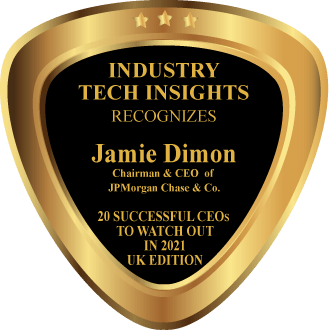
- February 20, 2026 4:28 pm
- California

Jamie Dimon
Chairman & CEO
Jamie Dimon, JPMorgan Chase chairman, and CEO shared wisdom with Ohio State University graduates during his commencement address on Sunday.
“I’m always hesitant to give advice, because it sounds like I did everything right,” Dimon said, “but I assure you, I did not.”
To start, Dimon told the graduates about the importance of learning from failure.
“All of you have been affected by Covid-19 in different ways. Your future is bright, but as you get older, it is inevitable that you will face tough times and failure, both personally and professionally,” Dimon said. “How you deal with failure may be the most important thing in whether you succeed.”
Throughout his career, Dimon has dealt with obstacles himself — in 1998, and he was fired from Citigroup by his mentor after the pair had worked together for 15 years. But, two years later, Dimon became CEO of Chicago-based Bank One, which JPMorgan Chase later bought.
Under his leadership, JPMorgan Chase overcame the Great Recession and became the nation’s largest bank.
“Learning is a lifelong pursuit,” Dimon said. “It’s your job to constantly learn, and it doesn’t end now that you’re college graduates. Regardless of what you do in life, to be successful, you need continuous learning and endless intellectual curiosity.”
He said that lifelong learning is essential to Dimon, adding that he spends “about 50% of my time reading and learning. It’s even more important in today’s increasingly complex and rapidly moving world.”
Along with reading, Dimon urged students to learn from other people and their actions.
“You can learn more from speaking to someone in 15 minutes than spending your life doing something,” Dimon said. “I learned a lot about what to do and what not to do by watching other people.”
Dimon received his bachelor’s degree from Tufts University in 1978 and his master’s degree from Harvard Business School in 1982. He also received an honorary degree from Ohio State University on Sunday. His current net worth is $1.9 billion, according to Forbes.
Bitcoin Is Worthless, Calls Government Regulation Inevitable
Bitcoin’s impressive showing over the past few weeks appears to have silenced many critics, but Dimon strongly disagrees with cryptocurrency being a serious investment. Dimon has made it known in the past that he is no fan of Bitcoin and has now reiterated his sentiment on the world’s most popular cryptocurrency, called it “worthless.” Dimon also stated that as an asset class, governments regulate cryptocurrency and that regulation is necessary.
Dimon, who has been a vocal critic of Bitcoin in the past, said, “I personally think that Bitcoin is worthless. But I don’t want to be a spokesman for that, I don’t care. It makes no difference to me.” That said, the largest bank in the U.S. will offer its clients exposure to Bitcoin, Dimon stated, while briefly speaking at the annual Institute of International Finance event.Dimon, who has been a vocal critic of Bitcoin in the past, said, “I personally think that Bitcoin is worthless. But I don’t want to be a spokesman for that, I don’t care. It makes no difference to me.” That said, the largest bank in the U.S. will offer its clients exposure to Bitcoin, Dimon stated, while briefly speaking at the annual Institute of International Finance event.
“Our clients are adults. They disagree. That’s what makes markets,” Dimon said. “So, if they want to have access to buy yourself bitcoin, we can’t custody it but we could give them legitimate, as clean as possible, access.”
The CEO of JPMorgan has assured that he now has no problem offering investment options to his Bitcoin-hungry clients, given their high interest in cryptocurrencies. This appears to be a significant shift in Jamie Dimon’s attitude. In 2017, the JPMorgan Chase CEO claimed he didn’t want any of his employees to trade Bitcoin, asserting that Bitcoin was a fraud “worse than tulip bulbs,” and even likened it to “fool’s gold” earlier this year.
Despite Dimon’s sentiments, JPMorgan began offering its wealth management clients access to crypto assets in July 2021. The CEO’s comments also seem to have had on Bitcoin’s bullish start to the week, inching closer than ever to a new all-time high.
Two best CEOs, according to Jamie
When it comes to naming the best CEOs in the game (excluding himself), two names immediately come to mind for Dimon.
″[Amazon’s] Jeff Bezos … [Apple’s] Tim Cook,” Dimon recently said on “Axios on HBO.”
Why? The JPMorgan Chase chairman and CEO told Axios about their ability to innovate and create a singular focus on serving customers.
Take Amazon’s customer service, for example; Dimon said: “[I]f you look at Amazon, look at what they built to do that.”
Bezos has long attributed his success to being customer-obsessed as opposed to competitor-obsessed. “The best customer service is if the customer doesn’t need to call you, doesn’t need to talk to you. It just works,” Bezos said in 2011.
Bezos’s and Cook’s drive is another reason, Dimon told Axios.
But it’s also no surprise Bezos was on Dimon’s shortlist. The two have been friends for decades, meeting back in 1997 when Dimon interviewed for a position at Amazon after being fired from Citigroup.
Dimon has said that he thought Bezos “had a real opportunity to build something,” back then. But heading to what was at the time a nascent online bookseller was “a bridge too far for my family, me. I’d spent my whole life in financial services. And so I decided I should probably find something in financial services,” he told Council on Foreign Relations chairman David Rubenstein in 2019.
Still, Dimon said he and Bezos “just hit it off and we’ve been friends ever since,” Dimon told Poppy Harlow in the CNN documentary “The Age of Amazon” in 2019.
Dimon has also compared Amazon’s game-changing innovation to things like Apple’s iPhone and Henry Ford’s Model T. In July, Bezos stepped down as Amazon’s CEO after 27 years at the helm. He now serves as executive chair of Amazon’s Board.
In 2018, Dimon and Bezos attempted to go into business together, creating a nonprofit joint venture with Berkshire Hathaway Chairman Warren Buffett called Haven. The venture’s goal was aimed at fixing health care and lowing costs for their employers. However, in January, the company shut down after the founding companies executed their projects separately, CNBC previously reported.
Offices will make a comeback
Dimon is no fan of the new remote work structure that has taken hold during the coronavirus pandemic.
The JPMorgan Chase chairman and CEO have already told his U.S. employees they should begin getting used to returning this month to have 50% of workers rotating through offices by July. While he’s fine with the greater flexibility allowed by employees working from home part-time, he said Tuesday that’s no substitute for being at the office.
“We want people back to work, and my view is that sometime in September, October it will look just like it did before,” Dimon said at The Wall Street Journal CEO Council. “And everyone is going to be happy with it, and yes, the commute, you know people don’t like commuting, but so what.”
While remote work and videoconferencing tools like Zoom have been crucial in allowing Wall Street traders and bankers to continue working during the pandemic, CEOs including Dimon and Goldman Sachs’ David Solomon have expressed dissatisfaction with the new model. That’s in contrast with technology companies like Facebook and Twitter, which have announced a permanent shift to remote work for those who want it.
“I’m about to cancel all my Zoom meetings,” Dimon said. “I’m done with it.”
As an illustration, Dimon said he was “brimming with ideas” after a trip to California last year that he wouldn’t get from Zoom meetings.
He also said clients had told him that in cases where JPMorgan lost business to rivals, it was because “bankers from the other guys visited, and ours didn’t. Well, that’s a lesson.”
Depending on their roles, employees will still be able to work remotely, Dimon said. JPMorgan currently cannot require workers to be vaccinated, and it won’t force those who object on religious or health grounds, he said.
The shift to part-time remote work is “not going to change everything so dramatically,” he said. “It accelerated a trend, but it does not work for younger people. It doesn’t work for those who want to hustle, it doesn’t work in terms of spontaneous idea generation.”
Still, not everyone at JPMorgan is thrilled with the prospect of more face time at the office.
“The wife of a husband sent me a nasty note about `How can you make him go back?” Dimon said.

“Lifelong learning is important to Dimon, he said, adding that he spends “about 50% of my time reading and learning. It’s even more important in today’s increasingly complex and rapidly moving world.”